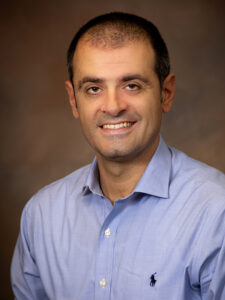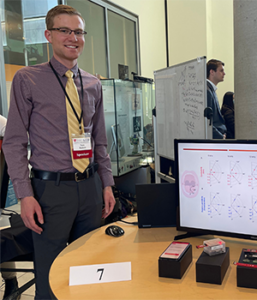
University of Utah electrical and computer engineering assistant professor Benjamin Sanchez Terrones has been awarded a $425,000 R21 grant from the National Institute of Health for his work involving tongue cancer patients. The grant will fund a collaborative project between Sanchez Terrones and Katherine Hutcheson from the MD Anderson Cancer Center in Houston, and will also support Ph.D. student Nathan Hansen, a member of the Sanchez Terrones’ lab.
The goal of this collaborative work is to ultimately improve swallowing outcomes in tongue cancer survivors. In some instances, patients who have survived tongue cancer can develop dysphagia because of radiation therapy, which can negatively impact their ability to swallow. Dysphagia can also increase the chances of death due to aspiration pneumonia when fluids enter the airway or lungs.
The team is working on a new mechanistic surveillance bedside device to evaluate the health of the tongue nerve in tongue cancer survivors. The current standard of care for these patients requires a small needle to be placed inside of the tongue.

“The needle recording process can be painful, the tongue is an extremely sensitive muscle,” explains Sanchez Terrones. “With this grant, we will be evaluating the feasibility of using a non-invasive ‘popsicle’ placed over the patient’s tongue to record electrical voltages as an alternative option to monitor the nerve health in the tongue. Ultimately, we hypothesize that by obtaining more frequent recordings than would otherwise be possible with a needle, we will be able to detect early tongue nerve deterioration in tongue cancer survivors before clinical symptoms appear.”
“This new information will allow clinicians to act and treat patients pro-actively instead of re-actively, consequently improving the quality of life of these patients before it is too late,” he adds.
Through evaluation and comparison to the current standard of care, the team will establish the technology as an alternative, non-invasive option for monitoring the tongue nerve health in patients with bulbar impairment.
Ph.D. student Nathan Hansen had previously been involved with this work and presented on the project at the 2023 ECE Technical Open House. Beginning this fall, the grant will support Hansen’s graduate research developing the algorithms that make non-invasive detection possible.